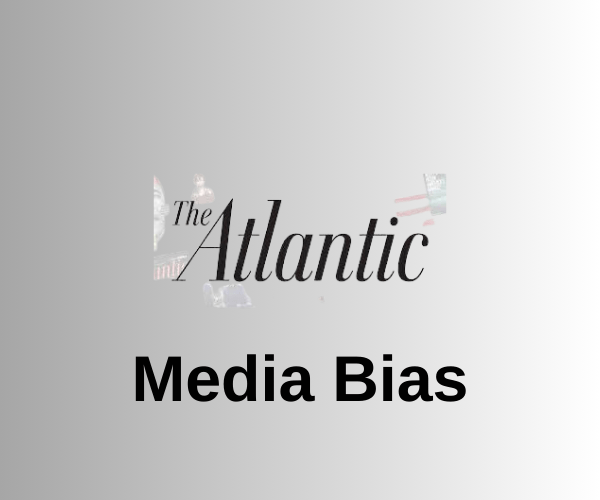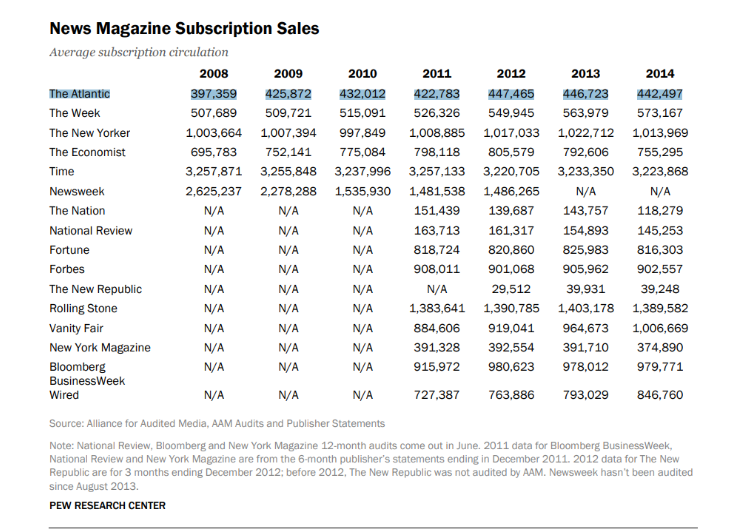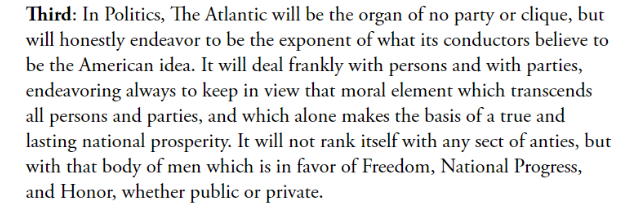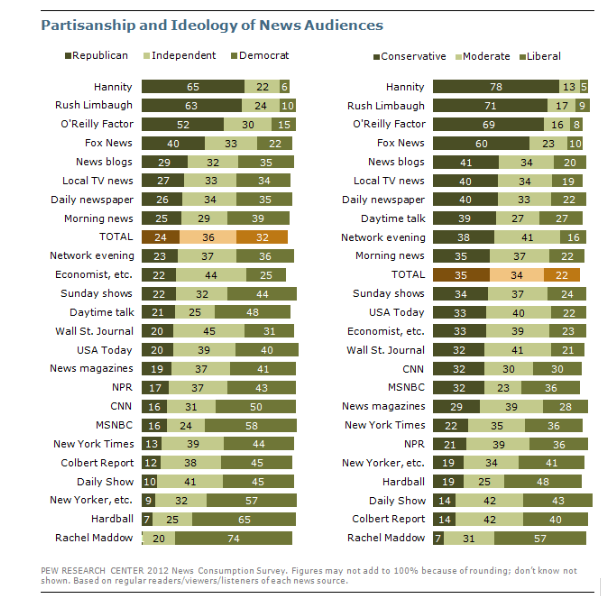
The Atlantic is a renowned American magazine that has been in circulation since 1857. Formerly known as The Atlantic Monthly, it was founded in Boston by the people who had “an overarching, prophetic vision,” opposed slavery, and moved to overcome the limits of partisanship, “believing that the free exchange of ideas across ideological lines was crucial to the great American experiment.” The Atlantic covers a wide range of topics, including politics, culture, economics, technology, and more. The magazine is known for its long-form journalism, essays, and articles that delve into complex issues of the day. As of 2023, the Atlantic has three Pulitzer Prizes.
According to a report regarding the state of the news media, composed by Pew Research Center, in 2014 The Atlantic’s number of subscription sales was 442,497. Nowadays, The Atlantic magazine has even higher sales and reports a monthly reach of more than 40 million. As an unprecedented growth in subscriber revenue happened in 2020, the Atlantic maintained record-high circulation and reached more than 833,000 of total circulation in 2021. Similarweb, a company that analyzes the traffic and engagement of websites, found that there were 38.2 million of total visits in March 2023. These numbers allow the website of the Atlantic to rank #42 by the value of business in the category of media and media publishers.

Source: Pew Research
The first issue of the Atlantic Monthly was published in November 1857 and contained its original mission statement, which was “signed by many of the greats of American letters, including Ralph Waldo Emerson, Herman Melville, Harriet Beecher Stowe, and Nathaniel Hawthorne.” Even after 165 years, the set of values regarding the coverage of politics is claimed to inspire modern employees of the magazine:

Source: The Atlantic
Remaining true to the original mission and pledging to be “the organ of no party or clique” is not an easy task, especially in the age of political polarization. Answering the question of whether the Atlantic still upholds its values and standards of an unbiased approach to political journalism requires a close examination.
How Does Biasly Rate News Sources?
Biasly’s algorithms produce bias ratings to help provide multiple perspectives on given articles. Biasly has analyzed 200,000+ news articles from more than 3,200 news sources through our A.I. technology and team of political analysts to find the most factual, unbiased news stories.
Biasly determines the degree of political bias in news sources by using Biasly’s Bias Meter Rating, in which Biasly’s team analyzes media sources’ reliability and bias and produces three scores, a Reliability Score that measures the accuracy of media sources; an A.I. Bias Score, evaluated by A.I.; and an Analyst Bias Score evaluated by political analysts. These scores are rated based on seven rating metrics including Tone, Tendency, Diction, Author Check, Selection/Omission, Expediency Bias, and Accuracy. These metrics help our analysts to determine the political attitude of the article.
Our A.I. machine-learning system employs natural language processing and entity-specific sentiment analysis to examine individual articles and determine their bias levels. By analyzing the key terms in an article such as policies, bias phrases, political terminologies, politicians, and their nicknames, the algorithms can rate the attitude of the text. Bias scores range from -100% and 100%, with higher negative scores being more liberal and higher positive scores being more conservative, and 0% being neutral.
Is The Atlantic Politically Biased?
In 2012, Pew Research Center stated that 57% of the Atlantic’s audience were Democrats with only 9% being Republican and 32% of Independent. The Atlantic is placed in the same category of niche news magazines and appears to share estimates with the New Yorker.
It is important to note that the political ideology and partisanship of the Atlantic’s readers could’ve changed since the last research was done. However, that change, if occurred at all, seemed to have a liberal direction, as some critics claim.

Source: Pew Research
Biasly’s A.I. Bias Score for the Atlantic sits as “Moderately Liberal,” and it rated the magazine’s Policy Leaning score to be “Moderately Liberal” as well. This evaluation means that the Atlantic provides political coverage that has a tendency to praise Democrat policies and politicians while disliking Republican ones.
Biasly’s scores nearly match the evaluations given by other third-party bias research agencies. For example, MBFC places the Atlantic in the “Left-Center bias” category, describing it as a media source with “a slight to moderate liberal bias.”
While the degrees and severity of the Atlantic’s liberal bias can be debated, the audience’s opinion of this magazine depends on their policy leanings. Readers like you may be likely to think highly of the Atlantic because of its editors’ tendency to favor liberal causes and people, as represented by Biasly’s “Medium Liberal” rating. In the remainder of this article, we’ll talk about ways to identify this bias so you can separate the opinions from the facts and become a more informed consumer of news.
Before we begin, we need to discuss bias. Bias is a natural function of humans, and we can express it both consciously and unconsciously. Bias is one of the most fundamental forms of pattern recognition in humans. This isn’t to lower the bar and say that “all things are biased,” but to explain the process in which we may come to trust certain news organizations that display patterns of coverage.
On the media’s part, there is an incentive to retain audiences, encourage them to purchase subscriptions, and rate products positively. Bias is a two-way street, people want to see news stories about things they care about, and the media needs viewers to continue their operations. This creates a positive feedback loop that influences what stories are covered and from what perspective. This also explains the actions of more liberal news organizations.
Analysis of Bias in the Atlantic’s Online Articles
The most up-to-date media kit of the magazine shows that 42% of its readers are Gen Z and Millenials. The average household income of the Atlantic’s audience reaches $154,000. Previous media kits break down the number of readers with higher education: 77% have a college degree and 41% have a postgraduate degree. Given the Atlantic’s highly educated and well-informed readership base, is the magazine really biased? We’ll look at a couple of their articles to identify the signs of political bias.
Determining bias requires evaluating metrics such as Author, Tone, Diction, Expediency Bias, and Tendency. The Author metric refers to whether the author of the article demonstrated his or her stance on political issues in other works. Tone helps to measure bias as it evaluates the attitude of the writing. The diction metric is similar to Tone but refers to the author’s word choices. The metric of Tendency can be described as the frequency or repetition of certain opinions or tone used throughout the writing.
First Example
The first example is an article by Mark Leibovich titled “Ron DeSantis’s Joyless Ride.” The Bias Meter gave it a score of -24% or “Somewhat Liberal.” The reason for such a rating can be seen in the first lines of this writing. The author describes the arrival of Ron DeSantis to New Hampshire as a comical, long-awaited event, emphasizing that he is not some “idealized Donald Trump alternative or voice in the far-off static Twitter Spaces,” but an actual human being “in the fidgety flesh.”
The author proceeds to ridicule the governor of Florida by claiming that he was unsuited for the quick photoshoot, as he “smiled for the camera like the dentist had just asked him to bite down on a blob of putty.” Throughout the article, there is a tendency to suggest that DeSantis clearly doesn’t know how to behave in front of a camera and lacks any sort of charisma to respond to the audience’s comments and questions. For example, the author compares his performances on paper and in practice, where on paper Ron DeSantis “proved himself an elite culture warrior” who was reelected by 19 points. Through this comparison Mark Leibovich discovers “the essential duality” of DeSantis’ campaign, claiming that he is good at “demonstrating outrage and “kneecapping” various woke abuses,” but can’t succeed in “the actual in-person performance of politics.”
The dismissive tone can be especially seen when the author summarizes Ron DeSantis’ talking points:
“Also, DeSantis said he’s a big supporter of “the death penalty for pedophiles” (applause); reminded every audience that he’d sent dozens of migrants to “beautiful Martha’s Vineyard” (bigger applause); and promised to end “this Faucian dystopia” around COVID once and for all (biggest applause).”
In the second half of the article, Mark Leibovich shifts to writing about how “DeSantis didn’t mention Trump without being prompted.” He interprets the politician’s words about ending “the culture of losing” for the Republicans as a vow that lacked an unsaid truth “that the GOP has underperformed in the last three national elections – and no is more to blame than Trump and the various MAGA disciples.”
The author’s diction contains various creative metaphors that describe how Ron DeSantis fails to perform in-person and how his wife Casey is slightly better at posing for photos but has nothing relevant to say. A clear tendency to emphasize the politician’s dislike for “wokeness” and criticism for mentioning the word “woke” too much instead of talking about gun violence and Donald Trump’s underperformance in office.
As for the author himself, Mark Leibovich was the chief national correspondent for the New York Times up until 2021. Biasly gives the NY Times a score of -52% or “Very Liberal,” which enables the suggestion that liberal bias can occur in Mark Leibovich’s work. His other articles in the Atlantic magazine, his current place of employment, seem to revolve around the former president’s mismanagement and criticism of Republican candidates. Titles of his articles illustrate both clickbait bias and his attitudes toward the GOP. For example, he wrote “Just Call Trump a Loser,” “Just Wait Until You Get to Know Ron DeSantis” and “The Tipping Point of Stupid” dedicated to “election-denying January 6 truther[s].”
Second Example
Although the Atlantic doesn’t specify it, this second example is more of an opinion piece rather than a report about what Ron DeSantis did during his campaign in New Hampshire. The second example is an article titled “The Book-Bans Debate Has Finally Reached a Turning Point,” despite click-baiting title attempts to report how the administration and liberal interest groups are pushing back against the recent book-bans.
The author’s word choice lacks descriptiveness when it comes to writing about the motivations of “conservative parents working with national right-leaning groups.” Meaning, only general terms such as “bans on books with racial or LGBTQ themes” are used to describe the content of books. The only recognition of the other side mentioned in the writing are sentences like:
“[M]ore Democrats see book bans as the weak link in the GOP’s claim that it is upholding “parents’ rights” through measures such as restrictions on curriculum or legislation targeting transgender minors.”
In a tone of a mere observer Ronald Brownstein briefly notes the lack of serious action from the administration regarding “woke” books, but almost immediately compensates this criticism with praise of President Biden’s decision to “focus his public communications less on culture-war disputes” during his 2022 campaign. Furthermore, the author’s tone suggests that Republicans are using parents’ rights as an excuse to push broader, discriminatory policies:
“[M]ore Democrats see book bans as the weak link in the GOP’s claim that it is upholding “parents’ rights” through measures such as restrictions on curriculum or legislation targeting transgender minors.”
“But as the parents’-rights crusade moved through Republican-controlled states, it quickly expanded well beyond academic concerns to encompass long-standing conservative complaints that liberal teachers were allegedly indoctrinating kids through “woke” lessons.”
There is a clear tendency to repeat the message that the GOP is just getting started with banning books in schools and will undoubtedly aim to limit more. The end of the article seems to intimidate the reader:
“The White House, the senior official told me, believes that after the Supreme Court last year rescinded the right to abortion, many voters are uncertain and uneasy about what rights or liberties Republicans may target next. “There is a fear about Where does it stop?,” the official said, and book bans powerfully crystallize that concern. Trump and DeSantis, who’s expected to join the GOP race, have both indicated that they intend to aggressively advance the conservative parents’-rights agenda of attacks on instruction they deem “woke” and books they consider indecent.”
These articles are a small representation of the content published in the Atlantic magazine, but they indicate that a great deal of the authors’ opinions are underscoring the importance of distinguishing genuine reporting and subjective writing.
Who Owns the Atlantic?
The Atlantic magazine is owned by Emerson Collective, an organization founded and chaired by philanthropist and businesswoman Laurene Powell Jobs, widow of Steve Jobs, the founder and former CEO of Apple. Emerson Collective acquired a majority stake in the Atlantic in 2017. An article in Commentary magazine even suggested that Jobs’ takeover correlates with the Atlantic’s new calling of “[s]aving America from Trump.”

Source: The New York Times
These theories become more persuasive, knowing that Laurene Powell Jobs has been a long supporter of liberal causes. She’s been an advocate for the DREAM Act and urged politicians and business leaders to support immigration reform in favor of undocumented children. Powell Jobs was one of the donors who aided the super PAC “Ready for Hillary” to raise $1.7 million in the first quarter of 2014. There are many other donations to Democrat candidates that demonstrate Laurene Powell Jobs’ political affiliations.
Ownership by a supporter of liberal policies and politicians doesn’t automatically guarantee an editorial slant but raises very reasonable concerns and suggestions about the Atlantic’s media bias.
How to Evaluate and Uncover Bias?
It can often be difficult to tell if the news you watch is biased. If you have settled on a news channel, it’s usually because you trust the information you are gaining. Unfortunately, many trust the information they are hearing because it confirms what they already believe. This is referred to as “confirmation bias.” It is important to challenge your beliefs and get third-party verification that what you are hearing is the full story. This is why we recommend using Biasly to compare different news stories side-by-side using our bias ratings to figure out what both sides think of a political issue.
Even though Biasly gave the Atlantic a -48% bias score, it is important to remember that bias varies by article. The Atlantic does not exclusively publish liberal thought pieces and contains the work of authors with various political opinions. Some types of articles will inherently have more or less bias. General news articles differ from opinion pieces and tend to be less subjective. Coverage of a highly polarizing social issue is more likely to have media bias than a less-discussed issue. Every article you encounter will be biased to some degree, which is why it is important to use Biasly’s News Check to help you determine the bias of what you read.






















